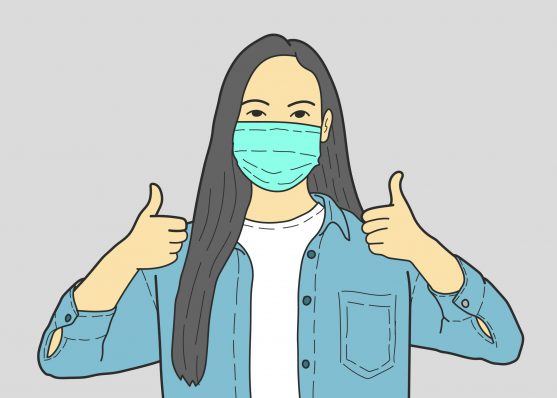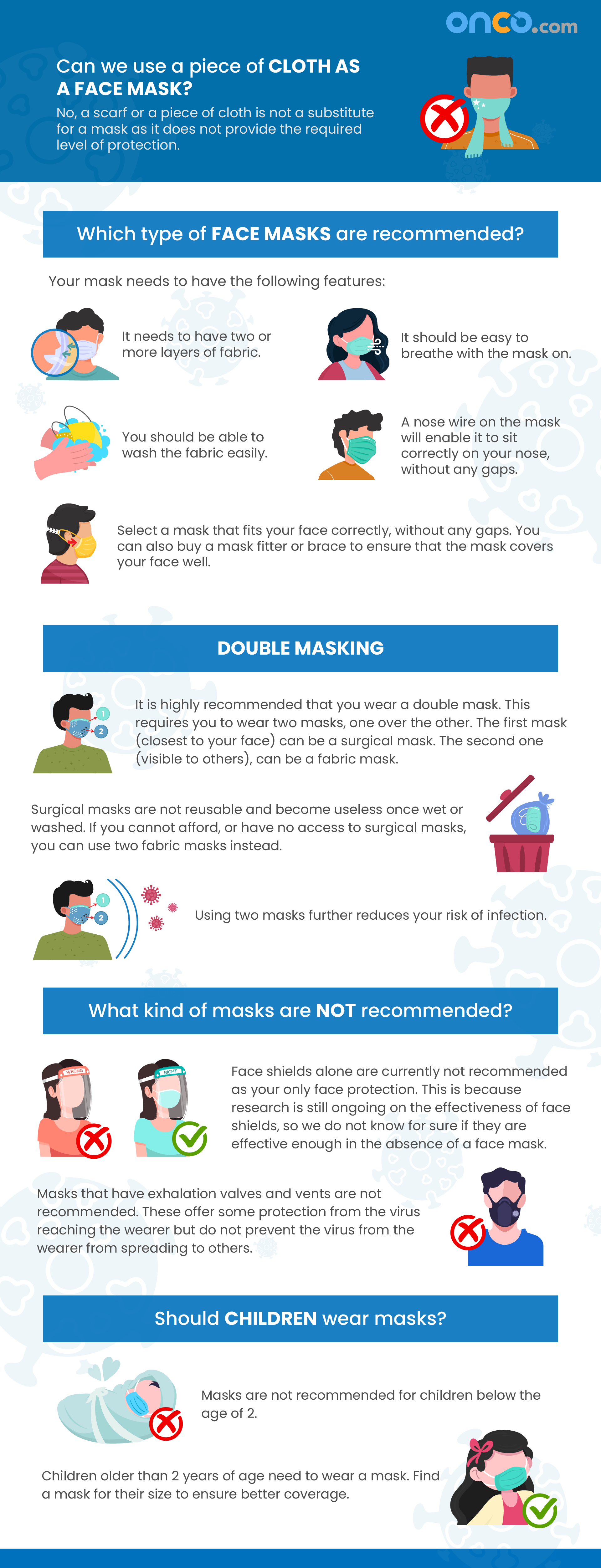According to several reports, a total of 153 million people have already been infected with the coronavirus globally, so far. The covid virus has hundreds of mutations resulting in newer strains that have been identified in different parts of the world, with some newer strains spreading faster than others.
There have been measures taken by all governments to control the spread of the virus. This second wave of pandemic has brought in a sense of panic and unrest among people, and to aggravate the situation, there have been rumours and myths about the coronavirus disease widely circulated across the online channels. One of the popular topics of discussion is the role of face masks in prevention of COVID-19.
For cancer patients and caregivers, it is very important to understand that cancer and its treatment may weaken their immunity, and they are at a higher risk of contracting the coronavirus infection. It is hence imperative to understand the right information about the preventive measures to be taken.

Face masks and the risks of COVID-19
COVID19 is highly contagious and commonly spreads by aerosols that are released by coughing or sneezing by infected individuals. The virus may also be released while the infected individuals speak. These aerosols (droplets of secretions carrying virus particles) fall on surfaces commonly touched by others or can be inhaled by others as they remain suspended in ambient room air and that’s how others may contract this infection.
Research also shows that this virus can be suspended in air for upto 3 hours. This means that it can enter your lungs if someone breathes it out into the air around you. However, experts are divided over how much of the transmission happens through this route.
People need to cover mouth and nose for 2 primary purposes-
- To prevent the generation of aerosols while coughing/sneezing or even while talking.
- To prevent inhalation of aerosols suspended in air
Face masks are recommended for everyone stepping out of their homes. Citing the highly contagious nature of the disease, face masks are mainly advised so that the infection spread is controlled.
For caregivers of cancer patients, it is important that you wear masks whenever interacting with your ward, as a precaution. Change your masks frequently, and ensure safe disposal of the old ones.
Not just the face masks, other recommended preventive measures against the coronavirus disease should also be ensured.
Can we use a piece of cloth as a face mask?
No, a scarf or a piece of cloth is not a substitute for a mask as it does not provide the required level of protection.

Which type of face masks are recommended?
You mask needs to have the following features:
- It needs to have two or more layers of fabric.
- It should be easy to breathe with the mask on.
- You should be able to wash the fabric easily.
- Select a mask that fits your face correctly, without any gaps. You can also buy a mask fitter or brace to ensure that the mask covers your face well.
- A nose wire on the mask will enable it to sit correctly on your nose, without any gaps.
Double Masking
It is highly recommended that you wear a double mask. This requires you to wear two masks, one over the other. The first mask (closest to your face) can be a surgical mask. The second one (visible to others), can be a fabric mask.
Surgical masks are not reusable and become useless once wet or washed. If you cannot afford, or have no access to surgical masks, you can use two fabric masks instead.
Using two masks further reduces your risk of infection.
What kind of masks are not recommended?
- Face shields alone are currently not recommended as your only face protection. This is because research is still ongoing on the effectiveness of face shields, so we do not know for sure if they are effective enough in the absence of a face mask.
- Masks that have exhalation valves and vents are not recommended. These offer some protection from the virus reaching the wearer but do not prevent the virus from the wearer from spreading to others.
Should children wear masks?
Masks are not recommended for children below the age of 2. However, children over the age of one, who have been trained to safely wear a mask, can do so.
Children older than 2 years of age need to wear a mask. Find a mask for their size to ensure better coverage.
How to use masks?
The most important part to keep in mind to ensure effective utilisation of face masks, is to know how to use them. Here are some steps you can follow –
- Clean your hands with soap and water (for 20 seconds) or alcohol-based sanitisers before wearing a mask
- Make sure your nose and mouth are covered by the mask and there should be no space between them
- Avoid touching your mask when you are wearing them, and if you do so, sanitise your hands with soap and water or a hand-rub
- While removing the mask, remove it from the back of your head and make sure you don’t touch the face of the mask
- Dispose the masks after each use in a closed bin and do not reuse them. Sanitise your hands post disposal
Face masks during cancer treatment
For people who may need to travel to hospitals and treatment centres, it is advisable to wear masks whenever out of home – throughout your travel, and even during the treatment if possible. For instance, if you are undergoing an IV chemotherapy treatment, you can continue to wear masks unless your doctor asks you to remove them.
Wearing masks indoors
According to the latest directives from the government of India, citizens have been advised to wear masks even inside their own homes. This is to prevent the spread of virus between family members.
It is also advised that you not invite people into your home, to reduce the spread of virus.
Do I need to use face masks even after vaccination against COVID-19?
Yes, you must continue wearing face masks even after you are vaccinated against COVID-19. This is important to continue protecting yourself and others from the virus.
Other concerns: Ventilation
While face masks reduce the spread of virus, there are certain other aspects that also need to be considered. The spread of the virus is more in crowded and poorly ventilated spaces. Improving indoor ventilation in your home can help reduce the spread of the virus.
Here are some ways to ensure that your home is properly ventilated:
1. Cross ventilation
Cross ventilation refers to the free movement of air, coming in from one window and going out through another. This would mean the windows need to be open and unobstructed.
2. Use of air-conditioning
Well-maintained air conditioners that do not allow recirculation of the same air within confined spaces can be used.
Any system that recirculates the same air within the room should be avoided as it will increase the risk of infection. Fan coil units, and split AC units fall into this category and should be avoided.
A MERV14/F8 filter or a highest compatibility filter used with your air conditioning unit can be used. Ensure that filters are periodically cleaned as per the manufacturer recommendations.
3. Use of fans
Ceiling fans can be used but the windows in the room need to remain open to ensure entry of fresh air.
Table fans need to be used with caution to avoid the blowing of air from an infected person onto an uninfected person. If the use of a table fan is unavoidable, then ensure that the room is well ventilated through open windows.
When isolating a sick person within your home:
- If possible keep them in a separate room, with a private toilet for them. The exhaust fan in the toilet needs to be on at all times.
- If it is not possible to provide a separate room for them, keep a distance of at least two meter from the sick person. All members within the home should wear a surgical mask at all times.
All of the above precautions can be taken without stigmatising the sick person. Remember that all patients require care and concern and a COVID-19 patient is no exception to this.
